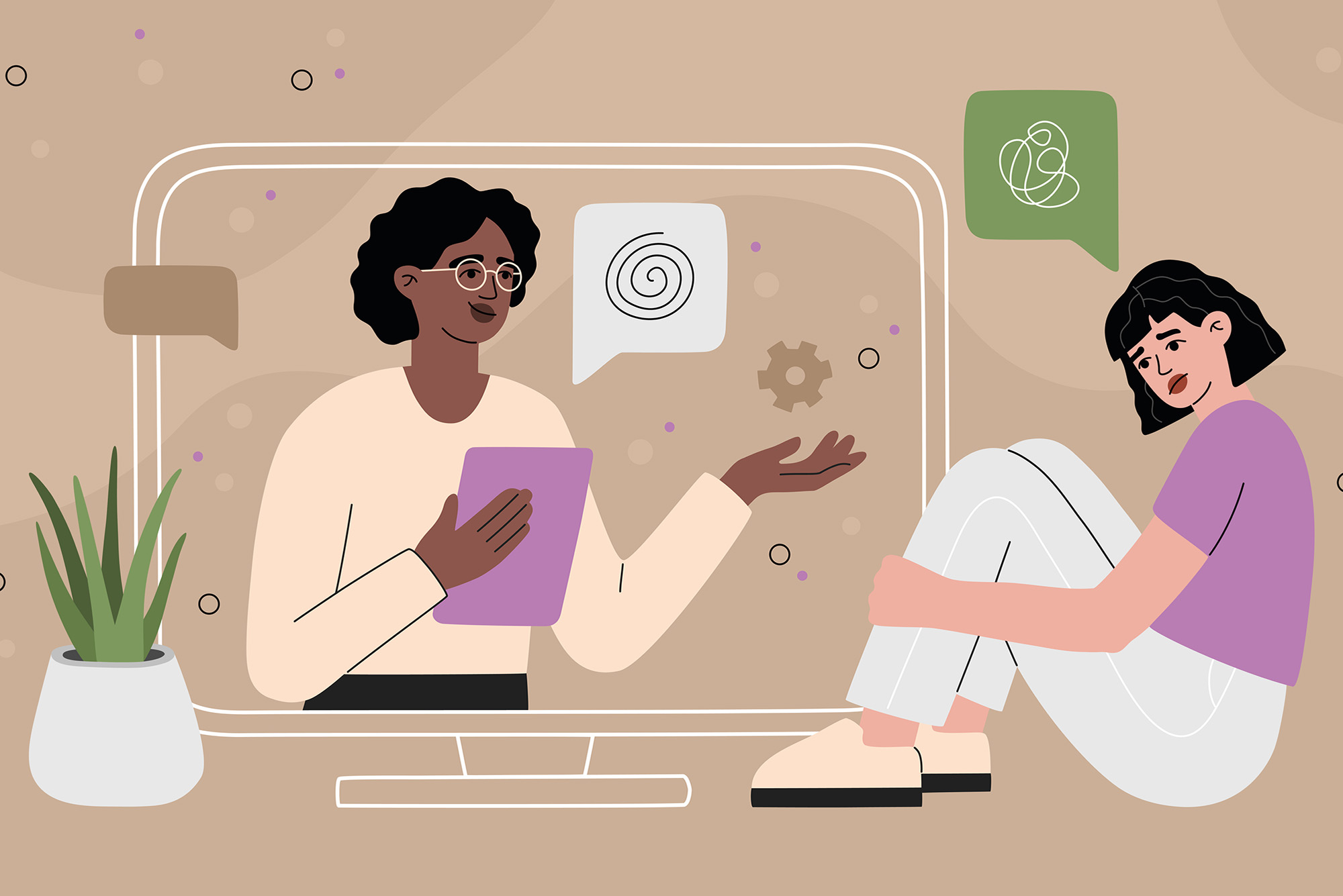National Depression Screening Day: Give Yourself a Mental Health Checkup Thursday
Free in-person and virtual questionnaires can help students, staff, and faculty connect with mental health experts

National Depression Screening Day: Give Yourself a Mental Health Checkup Thursday
Free in-person and virtual questionnaires can help students, staff, and faculty connect with mental health experts
Almost one third of adults experienced symptoms of depression this past spring, a year after COVID-19 was first detected, according to a new study led by BU researchers published earlier this week in The Lancet.
“COVID, abortion rights, global warming, and then being back at school, with classes, internships, applying to grad school—everything is just compounding,” says Brooke Angell (CAS’22), president of BU’s Active Minds chapter, a national student group advocating for mental health. “It’s hard to deal with. We’re made to believe this is ‘the new normal,’ but we don’t talk about the toll this is taking.”
This Thursday, October 7, is National Depression Screening Day, and BU is inviting students, faculty, and staff to take a free, confidential screening (either online or in person) that can identify those experiencing depression, anxiety, eating disorders, and other mental health issues. The purpose of the day is to elevate the importance of mental health, organizers say, and the role it plays in a person’s ability to thrive. The event is held during Mental Illness Awareness Week, which ends October 9. This is the 13th year BU has offered the questionnaire.
The mini mental-health checkup, which takes less than two minutes to complete, will be available both online (all day) and at the George Sherman Union Link (from 11:30 am to 3:30 pm). At the GSU, counselors will be on hand to chat with individuals about the results and connect people to relevant resources on campus.
Positive mental health is part of the foundation for satisfying and successful living as a student, staff, or faculty member.
A record 5,840 BU community members were screened during last year’s National Depression Screening Day: 25 percent tested positive for depression and 83 percent tested positive for anxiety, according to event organizer Dori Hutchinson (Sargent’86,’95), BU’s Center for Psychiatric Rehabilitation executive director. Hutchinson says she believes the high percentages (positive screening rates are normally between 35 and 50 percent) were related to the pandemic and the fact that vaccines were not yet available.
The national Healthy Minds Study (led by co–principal investigator Sarah Ketchen Lipson, a BU School of Public Health assistant professor of health law, policy, and management) polled more than 18,000 college students about their mental health last year. Among its findings: 39 percent of students polled had symptoms of depression, 34 percent were suffering from anxiety, and 47 percent said they had sought mental health treatment at some point in their lives. College is a common time for mental illnesses to emerge, experts say.
In addition to hospitalizations and deaths, “the pandemic resulted in lost jobs, social isolation, and lost or delayed important life events,” Hutchinson says. “This is difficult, frightening, and scary for all of us, and if one already lives with anxiety and depression, this is another significant layer for people to deal with and has really ratcheted up our anxiety and depression.”
Hutchinson says society continues to treat mental health as a moral weakness, and this is wrong. “There is enormous prejudice and discrimination towards people who live with serious mental health conditions,” she says. “So this screening is an attempt to make checking in on one’s mental health as important as making sure our physical health is okay.”
The short multiple-choice questionnaire asks about sleeping and eating habits, as well as other information that can detect risks for mood disorders and post-traumatic stress. Difficulty functioning day to day, not sleeping, changes in eating, withdrawing from friends, risky sexual behaviors, and thoughts of self-harm or suicide could signal a need for help.
The pandemic has made everyone realize how important mental health is, Hutchinson says. “Positive mental health is part of the foundation for satisfying and successful living as a student, staff, or faculty member.”
Melissa Paz, Student Health Services Wellness & Prevention assistant director of mental health promotion, says that for the past year, society has repeatedly entered new versions of “unprecedented” times, and without a definitive timeline for how long this uncertainty would last. The research shows that experiencing uncertainty can lead to feelings of anxiety and stress.
Paz says that the pandemic has proven how resilient students are, and she encourages them to keep working at this. “Being flexible with yourself and others, practicing optimism, and taking advantage of your support systems are just a few tools that can help build your resilience to challenging setbacks,” she says.
“It seems taboo to talk about mental health,” Angell says. “That’s why we have to hold these type of events—if you don’t talk about it you will burn out.”
Depression screenings will be available Thursday, October 7, online (look for the link in your email Thursday morning) and on the Charles River Campus at the GSU Link, 775 Comm Ave, from 11:30 am to 3:30 pm. The screenings are free, confidential, and open to students, faculty, and staff.
Depression Screening Day is sponsored by the Center of Psychiatric Rehabilitation, as well as the Danielsen Institute, Student Health Services Behavioral Medicine and Wellness & Prevention, the Center for Anxiety & Related Disorders, Faculty & Staff Assistance, and Marsh Chapel.

Comments & Discussion
Boston University moderates comments to facilitate an informed, substantive, civil conversation. Abusive, profane, self-promotional, misleading, incoherent or off-topic comments will be rejected. Moderators are staffed during regular business hours (EST) and can only accept comments written in English. Statistics or facts must include a citation or a link to the citation.